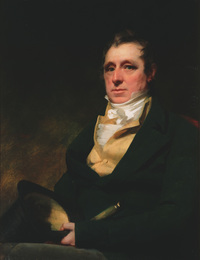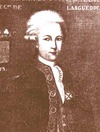
Source: Link
WALKER, ALEXANDER, explorer and author; b. 12 May 1764 in Collessie, Scotland, eldest son of William Walker, Church of Scotland minister, and Margaret Manderston; m. 12 July 1812 Barbara Montgomery in Scotland; d. 5 March 1831 in Edinburgh.
Alexander Walker’s father died when Alexander was seven. Although educated in St Andrews at the grammar school and the university, Walker later recorded that “poverty was vouchsafed . . . as a Counter balance to Family Pride,” adding that “younger Branches had to seek their fortunes in distant lands.” Like many young Scots, he turned to India, and was appointed an East India Company cadet in 1780. He sailed to Bombay in 1781; the following year he became an ensign. During the siege of Mangalore by the Indian leader Tipu Sahib, Walker served with distinction and, upon surrender of the fortress by the British in 1784, he offered himself a hostage as security for the conditions of the truce.
A bright and ambitious young man, eager to see what he could of the world, Walker jumped at the opportunity in 1785 to accompany merchant James Charles Stuart Strange* on a voyage to the northwest coast of America. The Bombay Council of the East India Company, hoping eventually to gain control for the company of the fur trade in that region, gave leave of absence to Walker and a small party of soldiers to accompany the expedition; Walker received command of the detachment, which was to be left in America as a garrison and factory. Leaving India late that year, the 350-ton brig Captain Cook and the 140-ton snow Experiment sailed via Goa, Borneo, and the Philippines for North America, arriving on the northwest coast in late June 1786. The expedition spent until 16 September trading and exploring from Woody Point (probably Cape Cook, B.C.) to Prince William Sound (Alaska), with extended stops at Friendly Harbour (Friendly Cove, B.C.) in Nootka Sound and in Prince William Sound. Especially at Friendly Harbour, Walker spent time ashore observing the natives and their way of life. Soon after the expedition’s arrival Strange decided for reasons of economy not to leave a garrison. Walker regarded this decision as wrong-headed, the result of a failure of nerve on Strange’s part.
Not involved in the trading activities of the expedition and having lost the raison d’être for his coming, Walker consoled himself by engaging in what was to be a lifelong interest: the observation and study of native peoples. The description he wrote of the customs, traditions, and habits of the Indians of Nootka and Prince William sounds was the first detailed account based upon extensive onshore study. After his return to India in 1787, Walker added other first-hand material, including the results of a lengthy interview, apparently in 1788, with John Mackay*, the only man Strange had left behind. Subsequently he revised his journal on several occasions in the light of new information and a growing ethnological literature.
Walker had a sharp eye and a willingness to speculate intelligently about what he observed. In addition, he was prepared to revise his views on the basis of superior evidence from other witnesses. Having studied Captain James Cook*’s Nootka vocabulary before his trip, Walker enjoyed some familiarity with that language, and he greatly enhanced it as his studies progressed. He was struck by the sharpness of the natives’ trading practices and by their general good health, important observations in these early days of culture contact. Originally convinced that the Nootkas were cannibals, he revised this judgement as a result of Mackay’s experiences. Despite a tendency to view the Indians as savages in a state of nature, Walker manifested a healthy relativism and functionalism in his assessments of their accomplishments and behaviour. “The Savage is the prototype of the Civilized Man,” he wrote. “His faculties are less cultivated, his mind is stored with fewer ideas, and his Character possesses less variety. In many of the useful and necessary Arts of Life however, and in that knowledge which is necessary for his safety, the Savage is almost on a level with those who are instructed in the arts of regular Life.” The struggle for survival accounted for “so many unfavorable features” in the Indian’s character, Walker surmised. “He becomes suspicious, deceitful and treacherous. The mere Savage is therefore scarcely capable of generosity: gratitude and humanity are not among the list of his virtues. Their exercise would be useless to him, and dangerous to the safety of his Person.” The same instinct for self-preservation also accounted for the virtues of the Indians, however. They were “alive to the feelings of nature and affection . . . [and] inently faithful to each other[, for] their safety depends on the strength of their mutual attachment.” Walker acknowledged that the Indian perceived life differently than did “civilized Man”; for the Indian, “the attachment to nature and liberty is more powerful than the temptations of voluptious pleasures.” Walker was also prepared to admit that Europeans were not free from inhumane practices and often treated the Indians with neither justice nor understanding.
After his return to India from the Pacific coast Walker enjoyed a distinguished military and administrative career in the service of the East India Company. He was promoted lieutenant in 1788 and subsequently served in a number of campaigns. In 1802 he was political resident at Baroda, and five years later he led an expedition into Kattywar (Kathiawar) for which he received “the highest approbation and applause” from the governor general. In Kattywar he succeeded in suppressing the local practice of infanticide. He became a lieutenant-colonel in 1808. Walker also continued his intellectual activities, accumulating a valuable collection of Arabic, Persian, and Sanskrit manuscripts. In 1810 he left for England, and he retired in 1812 to Scotland. Ten years later he was reactivated with the rank of brigadier-general to govern St Helena, which was then under the jurisdiction of the East India Company. Both in retirement and on St Helena he continued his ethnographic studies and revisions to the manuscript of his North American visit. He died in March 1831 shortly after retiring a second time.
[The manuscript of Alexander Walker’s journal, ready for publication, is in the NLS, Dept. of mss, ms 13780, among the vast Walker of Bowland papers, just a small fraction of which concerns North America. Only recently discovered, the journal was edited by Robin Fisher and J. M. Bumsted and published as An account of a voyage to the north west coast of America in 1785 & 1786 (Vancouver and Toronto, n.d.). Along with rough drafts (ms 13776–79 and 13781) and autobiographical notes (ms 13735) in the same collection, it constitutes the most interesting source for a study of Walker’s voyage. j.m.b.]
PABC, AA10, G79B, 6a (transcripts). Gentleman’s Magazine, January–June 1831: 466–68. James Strange, James Strange’s journal and narrative of the commercial expedition from Bombay to the north-west coast of America . . . (Madras, India, 1928; repr. 1929). DNB.
© 1987–2024 University of Toronto/Université Laval
Image Gallery

Cite This Article
J. M. Bumsted, “WALKER, ALEXANDER,” in Dictionary of Canadian Biography, vol. 6, University of Toronto/Université Laval, 2003–, accessed April 26, 2024, http://www.biographi.ca/en/bio/walker_alexander_6E.html.
The citation above shows the format for footnotes and endnotes according to the Chicago manual of style (16th edition). Information to be used in other citation formats:
| Permalink: | http://www.biographi.ca/en/bio/walker_alexander_6E.html |
| Author of Article: | J. M. Bumsted |
| Title of Article: | WALKER, ALEXANDER |
| Publication Name: | Dictionary of Canadian Biography, vol. 6 |
| Publisher: | University of Toronto/Université Laval |
| Year of publication: | 1987 |
| Year of revision: | 1987 |
| Access Date: | April 26, 2024 |







